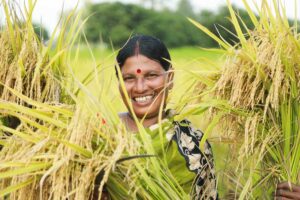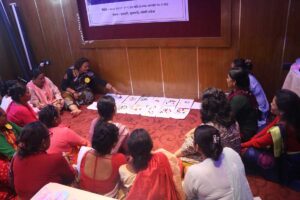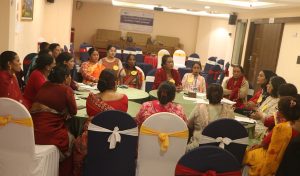Despite advances in women’s voice in democratic spaces and local governance in Nepal and Bangladesh, merely having women’s representation in leadership is not enough. Women from disadvantaged areas and from traditionally-excluded communities – including grassroots women and Indigenous, Dalit, and religious minorities – continue to be underrepresented in decision-making spaces that impact their lives and livelihoods.
Addressing this gap is the focus Samaan Aawaaj (“Equal Voice”): Intersectional Democratic Spaces in Nepal and Bangladesh, a partnership between Coady Institute and two women’s rights organizations in Nepal, The Story Kitchen and DidiBahini, as well as the Christian Commission for Development in Bangladesh (CCDB). This new three-year initiative, funded by Global Affairs Canada (4.8 million CAD) and set to begin in April 2025, seeks to enhance inclusive governance, promote and protect human rights, and advance gender equality in Nepal and Bangladesh.
Equal Voice builds on Coady Institute’s decades-long relationships and collaborations with all three partner organizations, who are women-led and dedicated to advancing women’s voices and empowerment. Coady has been working with CCDB since the 1970s and with DidiBahini since their inception in the 1990s, and The Story Kitchen in 2016 when they were founded.
“We are excited to continue, and deepen, our work with these three partners,” Julien Landry, Coady Institute teaching staff member, says. “The Institute has an impressive network, with almost 300 graduates in each country having attended Coady programs. Part of this initiative will involve engaging with and building upon this network to convene a broader dialogue that brings the voices and priorities of local communities to various levels of decision makers in both countries.”
The project will focus on working with marginalized women in some of the most disadvantaged areas in Nepal and Bangladesh. Using rights-based approaches and drawing on the principles of participation, equity, inclusion, transparency, accountability, and empowerment, Equal Voice will build the capacity of stakeholders to be more cognizant of their individual and collective rights and responsibilities, to better support women’s rights and empowerment, and to provide more equitable and inclusive public services for all.
The Story Kitchen works with women in Nepal to provide a space for their voice and share their stories through media tools. It provides a platform to the grassroots women across the nation to raise their voices on issues and experiences to seek social justice. The organization focuses on gender equity and women’s rights empowerment, and in feminist case studies development and collection of HERstories.
This project is not just about application; it is also about challenging and decolonizing knowledge systems and shaping the future of intersectional democratic governance
“People often talk about democratic governance, but this project takes it further by focusing on intersectional democratic governance,” Jaya Luintel, co-founder and president, says. “Together with our longtime partner Coady Institute, The Story Kitchen will co-create knowledge with women and the most marginalized communities in Nepal. For us, this project is not just about application; it is also about challenging and decolonizing knowledge systems and shaping the future of intersectional democratic governance.”
DidiBahini is a network-based organization working with 25 district-level organizations across Nepal to promote and contribute to building a gender-equitable and just society through supporting national and international-level research, action research, and development projects. Over three decades, DidiBahini has developed thousands of trainers, researchers, thematic experts, advocates, and activists as its resource base, and will call on this wealth of multidisciplinary experts as required for the effective implementation of this project and to expand its reach and purpose.
CCDB works in 28 of the 64 districts in Bangladesh. They are a non-denominational organization leading on issues of rural development and climate change, and have been adopting gender-responsive budgeting, climate resilience, feminist advocacy, and asset-based community development approaches in their work. A leader in community-based climate solutions, CCDB has a Climate Centre – a hub for climate learning, knowledge sharing, technology demonstration, and capacity development – which will act as a key resource for the project.
“We are immensely grateful for Global Affairs Canada’s support to the Equal Voice initiative in the Indo-Pacific region,” Juliate Keya Malakar, CCDB Executive Director, says. “For CCDB, as a development organization, this partnership represents a pivotal moment in our commitment to fostering empowerment and social justice. It enables us to support Indigenous women from marginalized communities in North Bengal, Bangladesh, in rising as leaders, bridging cultures, breaking barriers, and transforming governance. Together, we will amplify their voices and pave the way for a more inclusive and accountable future for all.”
Equal Voice was designed in response to Global Affairs Canada’s Call for Strengthening Civil Society and Democratic Spaces in the Indo-Pacific 2024-2028. The government made the announcement March 9 as part of $272.1 million of funding to development projects in the broader Indo-Pacific region.

Samaan Aawaaj will support Indigenous women from marginalized communities in North Bengal, Bangladesh. Photo courtesy of Christian Commission for Development in Bangladesh

Samaan Aawaaj will support Indigenous women from marginalized communities in North Bengal, Bangladesh. Photo courtesy of Christian Commission for Development in Bangladesh

Women synergizing and empowering one another while creating a web of resilience in feminist leadership workshops. Photo courtesy of The Story Kitchen

